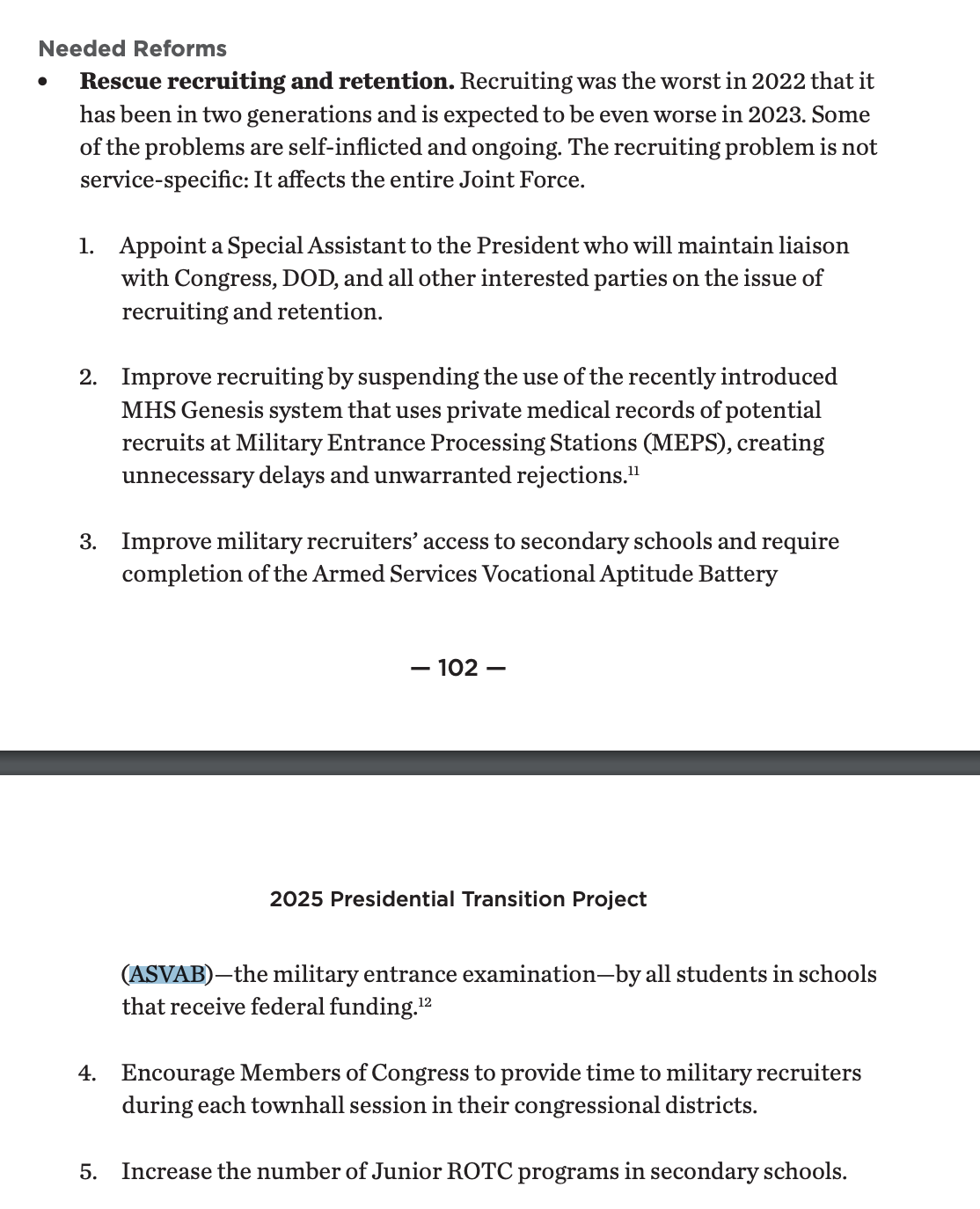

Understanding Project 2025: Military Entrance Exam Requirements For High School Students
In today's complex educational landscape, policy proposals can have significant implications for students and families alike. One such proposal is Project 2025, which has emerged as a topic of discussion among educators, parents, and political figures. This initiative, associated with a conservative coalition, has sparked debates about the future of education and military recruitment in the United States.
The crux of the matter revolves around the requirement for public high school students to take the Armed Services Vocational Aptitude Battery (ASVAB), the military's entrance exam. This requirement raises important questions about educational equity and the role of military testing in public schools, especially for students who may not wish to pursue military careers. As discussions continue to unfold, understanding the implications of this proposal is crucial for all stakeholders involved.
Amidst this backdrop, rumors have circulated on social media regarding the specifics of Project 2025. The proposal suggests that all public high school students, particularly those in schools receiving federal funding, should be mandated to take the ASVAB. This has led to a mix of concerns and support from various communities, each reacting based on their perspectives of military involvement in education.
Table of Contents
- Overview of Project 2025
- Military Entrance Exam Requirements
- Context and Implications of Project 2025
- Public Reaction and Discussions
- Final Thoughts on Project 2025
Overview of Project 2025
Project 2025 is a proposed initiative aimed at reshaping military recruitment strategies in the United States. The plan primarily targets public high schools, suggesting that students should complete the ASVAB as part of their educational journey. This proposal reflects a growing concern about military recruitment numbers and the perceived need for greater access to students in educational institutions.
Supporters argue that implementing such a requirement could provide students with valuable insights into their skills and potential career paths, even if they do not choose to enlist in the military. Critics, however, express concerns about the ethical implications of requiring a military exam for students, particularly those who may not have any interest in serving in the armed forces.
Military Entrance Exam Requirements
The ASVAB, or Armed Services Vocational Aptitude Battery, serves as a crucial tool for military enlistment, assessing a candidate's abilities in various areas. Under the proposed Project 2025, the requirement would extend to all public high school students, emphasizing the need for military recruiters to access a broader pool of potential recruits.
According to the proposal, students in schools that receive federal funding would be required to complete the ASVAB. This requirement raises questions about the implications for students' future educational choices and career aspirations, particularly for those who may feel pressured to consider military service as a viable option.
Context and Implications of Project 2025
The introduction of mandatory ASVAB testing in public schools marks a significant shift in the relationship between education and military recruitment. Proponents of the initiative argue that it is necessary to address challenges in military recruitment, especially as fewer young people express interest in joining the armed forces.
However, the implications for students are profound. Critics argue that mandating military testing could create an environment where students feel compelled to pursue military careers, even if it is not their desired path. This concern highlights the importance of ensuring that students have a range of career options and are not unduly influenced by external pressures.
Public Reaction and Discussions
The announcement of Project 2025 has generated substantial discussion and debate among various communities. Some parents and educators support the initiative as a means to prepare students for potential military careers, while others express concerns about the ethical implications of requiring military testing in schools.
Online forums and social media platforms have amplified these discussions, with many users sharing their perspectives on the proposal. The reactions range from strong support for military readiness to staunch opposition based on principles of educational equity and student autonomy.
Final Thoughts on Project 2025
In conclusion, Project 2025 represents a pivotal moment in the intersection of education and military recruitment. As discussions continue, it is essential for all stakeholders to engage in meaningful dialogue about the implications of mandatory ASVAB testing and its potential impact on students' futures.
Ultimately, the successful implementation of such a proposal will require careful consideration of the diverse perspectives within communities and a commitment to ensuring that students' interests and rights are prioritized in the decision-making process.

(Mandate for Leadership 2025: The Conservative Promise)
Elon Musk's Tweets And Their Impact On Bud Light's Stock Valuation
Exploring The Unlikely Connection Between Lil Dicky And Benjamin Netanyahu
Exploring The Historical And Cultural Significance Of Tel Aviv's Iconic Beach Photo



